Table of Contents[Hide][Show]
In the journey of life, our skin often tells our story before we do. From laughter lines to the subtle imprint of years gone by, our skin reflects our experiences, emotions, and even our health. Just like the mind, our skin deserves a regimen that evolves with age. Beginning with an anti-aging skin care routine is not just about addressing visible signs of aging; it’s about nurturing, protecting, and loving your skin at every stage of life.
But when should you start using anti-aging skin care? And what exactly does this term mean in a world flooded with beauty buzzwords?
What Are Anti-Aging Skin Care Products?
Anti-aging skin care products are not just potions that promise eternal youth; instead, they are formulations designed to support the skin in its natural aging process, helping to reduce visible signs of aging while enhancing the look of skin health. These products typically focus on prevention, protection, and rejuvenation, addressing various skin concerns such as the appearance of wrinkles, fine lines, uneven skin tone, and loss of firmness.
At the heart of anti-aging skin care lies a blend of potent ingredients known for their rejuvenating properties.

- Antioxidants: Like guardians against time, antioxidants such as Vitamin C, Vitamin E, and green tea combat environmental stressors, a major contributor to the visible signs of aging.
- Peptides: These tiny protein fragments encourage the skin to improve the look of skin bounce, crucial components for maintaining the skin’s structure that help tighten and firm your look.
- Natural oils and butters: Ingredients like jojoba oil, chia seed oil, and shea butter not only deeply moisturize and nourish the skin but also offer a barrier against environmental damage.
- Herbal extracts: Compounds from plants such as aloe vera, lavender, edelweiss, plantago, life everlasting flowers, buddleja, and chamomile support the skin’s natural rejuvenation process.
When To Start Using Anti-Aging Skin Care Products
There’s no one-size-fits-all answer, but most people start using anti-aging skin care products in their mid-20s to early 30s. This is when the body’s natural collagen production starts to slow down, leading to the initial signs of aging such as the appearance of fine lines and a slight loss in skin firmness.
Here are some points to consider when determining the right time to start using anti-aging products:
- Skin type and conditions: Dry or sun-damaged skin might show signs of aging earlier than oily or well-hydrated and moisturized skin. Assess your skin’s condition and consider starting earlier if you have concerns.
- Lifestyle factors: Exposure to sun, pollution, and other environmental factors can accelerate skin aging. If you lead an outdoor lifestyle or live in a high-pollution area, introducing anti-aging products earlier can help combat these external stressors.
- Personal goals and concerns: Reflect on what you are hoping to achieve with your skin care routine. If maintaining a youthful and vibrant complexion is important to you, beginning sooner rather than later can be advantageous.
Remember, using anti-aging skin care products is about nurturing and supporting your skin’s health over the long term. It’s not about the immediate eradication of lines and wrinkles but about providing your skin with the nutrients and care it needs to age gracefully and naturally.
The Role of Lifestyle in Aging
While skin care products play a vital role in maintaining skin’s appearance, they are just one piece of the puzzle. Your lifestyle choices can significantly impact the health and aging of your skin. Understanding the connection between lifestyle and skin can help you make informed decisions that support your skin’s well-being.
- Diet and hydration: Nourishing your body with a balanced diet rich in vitamins, minerals, and antioxidants can support skin health. Foods high in vitamins C and E, for example, can help protect the skin from the visible effects of environmental stressors. Opt for organic and local when possible, as well as pasture-raised, grass-fed and finished meats and wild caught seafood. Adequate hydration is also crucial; drinking enough water helps maintain your skin’s moisture balance. If accessible, use spring water, or consider adding minerals back in if using reverse osmosis filtered water.
- Exercise: Regular physical activity increases blood flow, helping to maintain healthy skin by promoting the removal of toxins and encouraging the renewal of skin cells. Exercise can also reduce stress, which has been associated with various skin concerns. Find small ways to move and incorporate something you love, like walking, hiking, dancing, hula hooping, practicing yoga, and more.
- Sleep: Quality sleep is essential for skin health. During sleep, your body enters a reparative state, where it can address the daily wear and tear on the skin. Lack of sleep can lead to a tired-looking complexion and visible signs of aging.
- Skin protector: Ultraviolet (UV) rays from the sun can accelerate the appearance of aging in the skin if unprotected. Using sunscreen daily, seeking shade, and wearing accessories and clothes that cover the skin can help protect you from UV overexposure.
- Stress management: Chronic stress can affect the skin’s ability to maintain moisture and may contribute to the appearance of aging. Practices such as mindfulness, meditation, and adequate rest can help manage stress levels.
How To Start Using An Anti-Aging Skin Care Routine
Starting on an anti-aging skin care routine doesn’t have to be overwhelming. By integrating simple, targeted steps into your existing regimen, you can effectively support your skin as it matures.
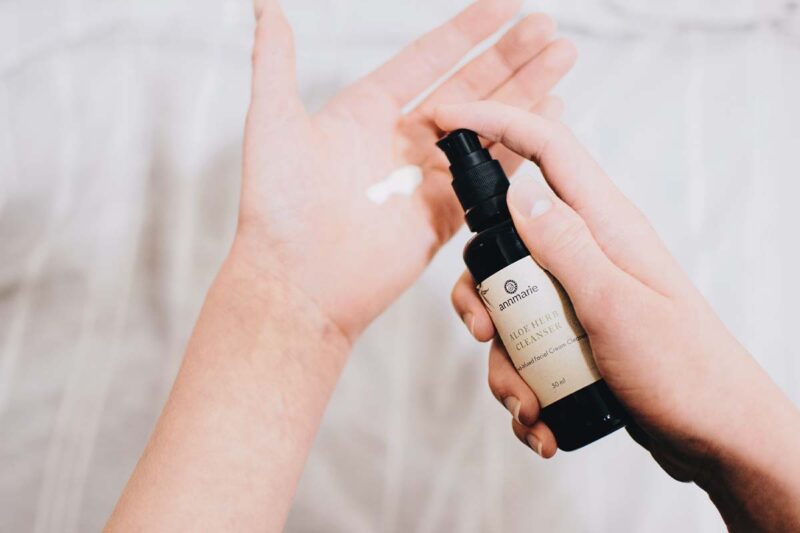
- Gentle cleansing: Begin with a gentle, pH-balanced cleanser to remove impurities without stripping your skin of its natural oils. Cleansing prepares your skin to better absorb the products that follow.
- Non-chemical skin protector: Daily use of a mineral-based broad-spectrum sunscreen can help protect your skin from premature aging caused by sun exposure. Apply sunscreen every morning, even on cloudy days, and reapply as needed throughout the day.
- Hydrate: Keeping your skin hydrated is essential. You can do this with a toning mist or serum, however, serums typically tend to be more activated and deliver deeper hydration. Look for ingredients like hyaluronic acid, saccharide isomerate, or tremella mushroom. This step in your skin care routine addresses dehydration (not to be mistaken for dryness), which tackles the look of “deflated” skin, fine lines and wrinkles.
- Moisturize: Look for moisturizers that contain nourishing ingredients like biocompatible oils. For example, someone with dry or mature skin would benefit greatly from jojoba oil, while someone with oily skin may prefer to use black cumin seed oil. These ingredients help maintain the skin’s moisture barrier, keep skin soft and supple, and reduce dryness and the appearance of lines.
- Individual, targeted method: Introduce products with activated ingredients that address specific aging concerns. For example, serums containing antioxidants like vitamin C can help address dullness, uneven skin tone, and visible signs of environmental damage, while retinol-alternatives can help resurface your complexion and improve the appearance of fine lines and uneven skin tone. Remember to introduce new products gradually and monitor your skin’s response.
- Consistent night routine: Nighttime is when your skin rejuvenates itself, so apply products like retinol-alternatives, AHAs, or peptides before bed to support the skin’s natural renewal process.
- Healthy habits: Complement your skin care routine with a healthy lifestyle, including balanced nutrition, adequate hydration, regular exercise, and sufficient sleep.
- Patience and consistency: Results from skin care products don’t happen overnight. Consistent use and patience are key to seeing improvements. Give products time to work, typically several weeks to months.
The Importance of A Non-Chemical Skin Protector
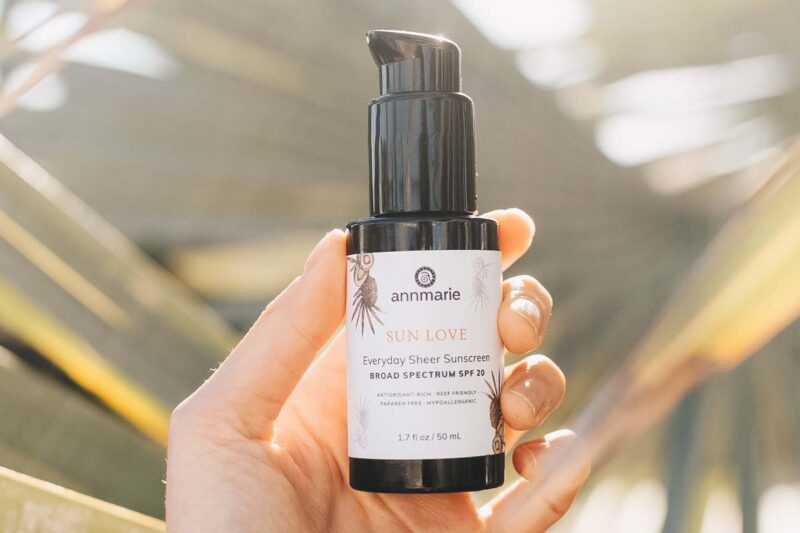
Evening out the appearance of skin tone is a fundamental aspect of any skin care routine, especially when it comes to anti-aging. The sun emits ultraviolet (UV) rays that can lead to sunburn, damage skin cells, and accelerate the appearance of aging in the skin, such as fine lines, wrinkles, and changes in texture and color.
Here are key points to ensure you effectively infuse your skin with proper sun protection:
- Use broad-spectrum, mineral-based sunscreen: Choose a sunscreen that provides broad-spectrum protection, meaning it shields your skin from both UVA and UVB rays. Look for products with non-nano zinc oxide and have an SPF of at least 20.
- Apply sunscreen correctly: For effective protection, apply sunscreen generously on all exposed areas of your skin 15 minutes before heading outdoors. Remember to reapply at least every two hours, or immediately after swimming or sweating.
- Seek shade: Whenever possible, stay in the shade, especially during the sun’s peak hours between 10 a.m. and 4 p.m. This can help reduce your risk of sun damage significantly.
- Wear protective clothing: Long-sleeved shirts, pants, and wide-brimmed hats can provide an extra layer of protection against the sun’s harmful rays.
- Be mindful of reflective surfaces: Water, snow, and sand can reflect and intensify the effects of the sun. Even on cloudy days, up to 80% of UV rays can pass through the clouds, so it’s important to wear sunscreen, regardless of the weather.
Myths vs. Facts
Here are some common misconceptions and facts about anti-aging skin care, helping you make informed choices for your skin with many myths surrounding anti-aging products
- Myth number 1: Only older people need to use anti-aging products.
- Fact: Starting anti-aging skin care in your mid-20s to early 30s can help nurture and address the visible signs of aging that happen as collagen production naturally slows down.
- Myth number 2: High SPF sunscreens protect you all day.
- Fact: No sunscreen offers all-day protection. Reapply every two hours and immediately after swimming or sweating for effective coverage.
- Myth number 3: More expensive skin care products work better.
- Fact: The effectiveness of skin care products depends on their ingredients and how well they suit your skin type, not their price. Plus, not all expensive skin care products use high-quality, effective ingredients (and sometimes, they may not always disclose their full ingredient list), so don’t be afraid to reach out to brands and ask questions!
- Myth number 4: Anti-aging products can completely eliminate the look of wrinkles.
- Fact: While anti-aging products can help reduce the appearance of fine lines and wrinkles, they cannot completely erase them.
Conclusion
Incorporating anti-aging products into your skin care routine is a personalized journey that evolves with your skin’s needs and life stages. By understanding the importance of ingredients, skin protection, and the role of lifestyle in skin health, you can make informed choices that contribute to the overall well-being and appearance of your skin.
Remember, the best time to start caring for your skin is now, and it’s never too late or too early to adopt habits that support a vibrant, healthy complexion.
Frequently Asked Questions
When Does Aging Start?
Aging is a natural process that begins at birth, but the visible signs of skin aging typically start to appear in our mid-20s to early 30s as the production of collagen naturally decreases and environmental factors start to take their toll.
What Ingredients Cause Aging in Skin Care?
Ingredients that can contribute to the visible signs of aging include harsh synthetic chemicals, alcohol, and certain fragrances that can potentially harm your skin health or strip the skin of its natural oils, leading to dryness and irritation. Always opt for products with high-quality, nature-powered, nourishing and protective ingredients that support skin health.
Is It Okay to Use Anti-Aging Products at a Young Age?
Using anti-aging products at a young age can be beneficial, especially as a preventive measure. Starting in your mid-20s with products that contain antioxidants and offer hydration and UV protection can help delay the visible signs of aging.
How Often Should I Change My Anti-Aging Skin Care Routine?
Your skin’s needs can change based on factors like age, season, and environment. It’s a good idea to assess your skin care routine and make adjustments as needed, typically every few months or whenever you notice changes in your skin.
Do Anti-Aging Products Work on All Skin Types?
While anti-aging products are designed to address common signs of aging, their effectiveness can vary based on your skin type and the product formulation. It’s important to choose products that are suited for your individual skin needs.
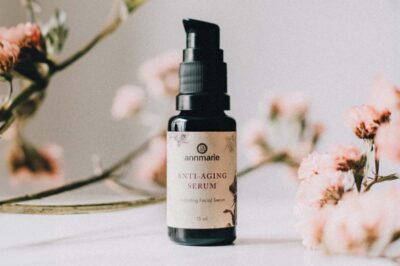

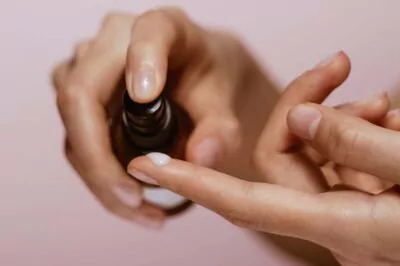
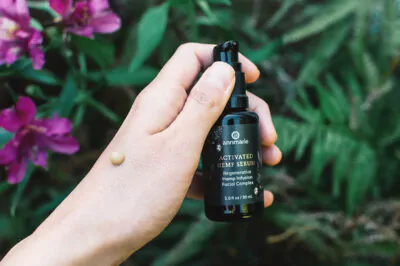
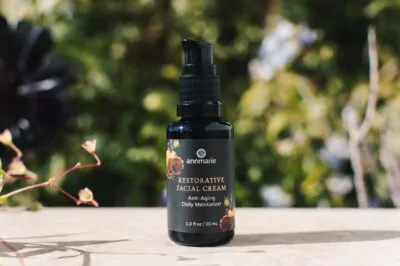



Leave a Reply